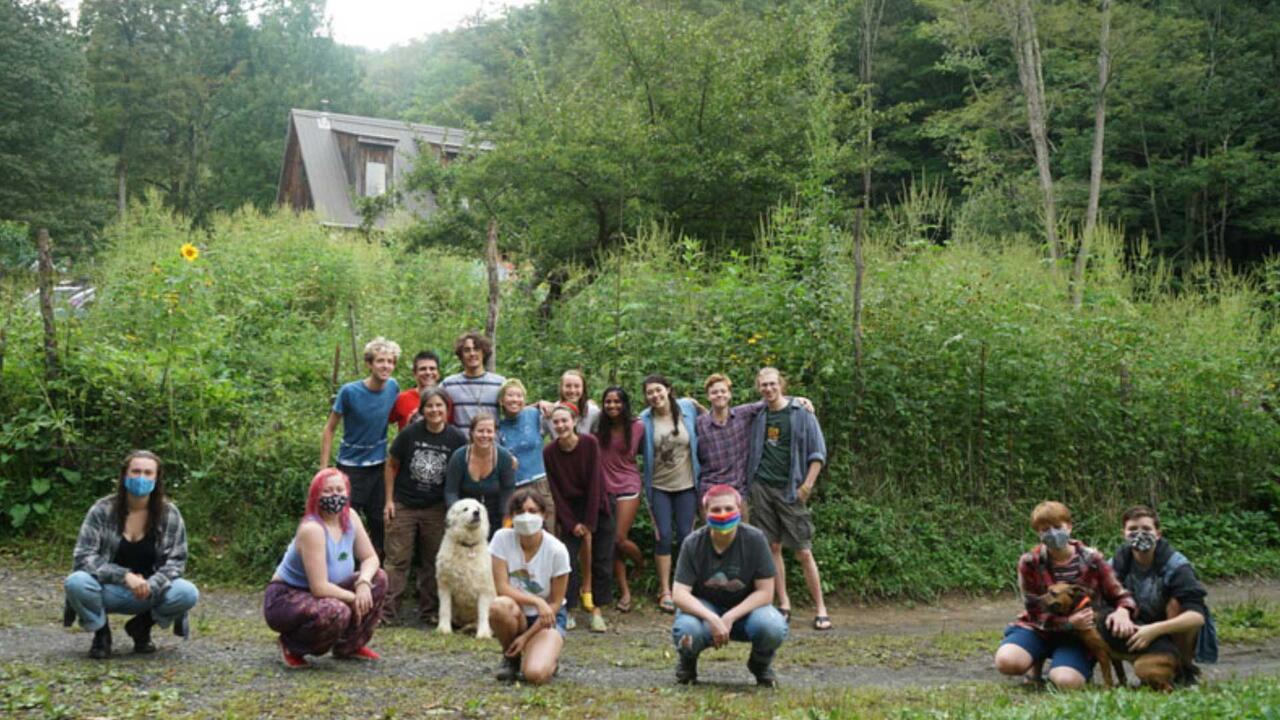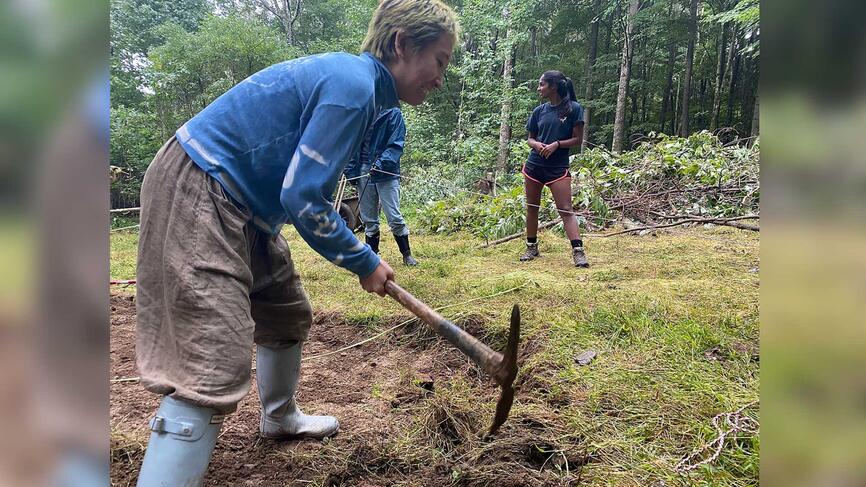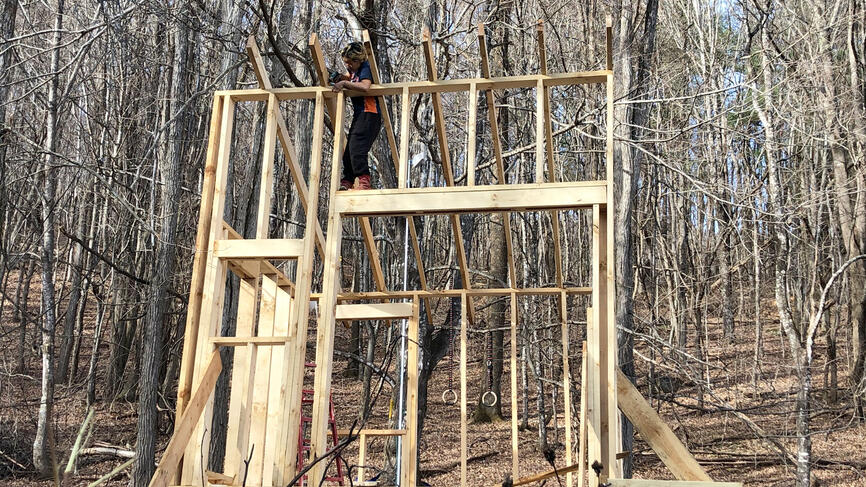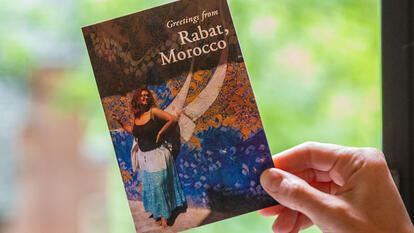Lessons From Whitney Xu ’20 on Farm Life Off the Grid in Rural North Carolina

Whitney Xu ’20 first visited Woodland Harvest Mountain Farm on an alternative spring break trip through Career Education in 2018. They connected instantly with the farm’s owners, Lisa and Elizabeth, and loved daily life in their corner of the woods along Appalachia’s Blue Ridge in North Carolina. This fall, Xu and their partner organized an opportunity for a group of Olin College of Engineering students to spend the semester on the farm, building cabins for future visitors and living off the grid—using compost toilets, solar and hydro electricity, and woodstove heating, and growing much of their own food. Xu took us through the ups and downs of farm life.
What’s a day in your life like at Woodland Harvest?
A day on the farm is full of constant running around.
Many of us gather around 10 or 11 a.m. to begin work at the build site, which lasts most of the day. We usually have dinner as a group and hold a short meeting to make announcements. By 7 p.m., we split off to play board games, play music, or hang out until bed. We spend weekends off in nature.
What have you learned from your day-to-day activities, living off the grid in a community like this?
Living off-grid definitely takes adjusting to! There are a number of modern conveniences that we don’t have here, including flushing toilets, so we use compost buckets in the indoor bathroom and an outhouse outside.
Our energy comes from solar panels and a micro-hydro system that depends on the running water of the nearby creek. On days with little sun, we have to be frugal with our energy consumption lest we lose power. This means charging devices during daylight hours and not using lights unless completely necessary. We also use coolers instead of a refrigerator, so we have to be very aware of what food we have and what may be going bad soon. This has taught me a lot about how much energy we consume when living in a normal house, and how much food waste is produced without us even realizing it.

Seeing how difficult it is to get heat from raw materials makes me more aware of consumption in many ways. The entire process, from going into the forest with a chain saw to cut down trees, to eventually starting and maintaining a nice fire, takes a long time!
Another big challenge here, especially for students in classes, is the satellite Wi-Fi, which is not the fastest or most reliable.
What has it meant to you to have this experience during the pandemic?
I have never been so immersed in a lifestyle that emphasizes living off the land without depending on modern civilization and capitalist societies.
I am extremely lucky to be living in a bubble in this beautiful sanctuary-like space. Sometimes, it can be a relief to live in such blissful ignorance and just work on the things directly in front of me, but I also need to remember what is happening outside of my bubble.
How has this experience built on what you learned at Wellesley?
I worked under Andrew Kemp in the Pendleton wood shop for three years and gained a set of invaluable building and woodworking skills that I apply here every day. At Wellesley, the shop environment made me feel safe and confident in my abilities to operate power tools, create building plans, and fabricate exactly what I envisioned. Andrew played a huge role in my woodworking experience, and I feel so grateful for his mentorship.
My friendships at Wellesley also taught me so much about community and reciprocation. I think of my friends every day and try to emulate their loving personalities in the community I’m living in.
What made you want to return to Woodland Harvest?
I have wanted to come back to Woodland Harvest ever since I first came with Wellesley on an alternative break in 2018. Elizabeth and Lisa, the owners of the farm, are two of the most magical people I know, and I had never met anyone before who loved and accepted me so immediately without question. As a person of color, I had some preconceived notions about the prejudices that the South holds. But Lisa and Elizabeth quickly showed me their kindness and acceptance for all people, and ever since then I’ve had an amazing relationship with them both.

Does life at the farm feel more like school or like play?
Life feels more like work than play because there are so many foundational stones that need to be set. We are building some complicated and work-intensive living structures: an octagonal communal living structure, a “Crone’s Cottage,” which is an accessible building for elderly folk, and a tiny house for me and my partner to reside in. On top of that, weeds need to be weeded, meals need to be cooked, dishes need to be cleaned, the study space needs to be tidied, animals need to be fed, and so much more.
At the same time, I also have a lot of fun with the members of the community, who are all vivacious, funny, good-natured cuties. When we do a big load of dinner dishes together while blasting music, it is most definitely play rather than work.
How is the community staying safe during the pandemic?
We followed strict guidelines when everyone was arriving. Anyone who drove to the farm was expected to sanitize and wear masks at rest stops throughout the drive, and people who flew here were required to wear masks for the first two weeks and spend most of their time outside. The occasional visitor must test negative before being unmasked around the group. We limit grocery runs as much as possible and don’t usually go into town. So far, we have had no positive cases at the farm, and I feel pretty optimistic about the remainder of our time here.
How will you spend Thanksgiving?
We have three free-range turkeys on the farm, and will most likely be harvesting at least one for a Thanksgiving feast. We have many talented cooks, so we will have lots of delicious bread, mashed potatoes, soup, and pumpkin pie, among other things. We will probably also have a small ceremony or ritual in which we honor the Indigenous people who lived on the land before us, and give thanks to their spirits and presence on the land.
How long will you and the Olin students be at Woodland Harvest?
I’ll be here until mid-December, when the Olin semester ends, and will return home to New Jersey for a few weeks. The same goes for the other Olin students who are still here. In mid-January, I will return to Woodland Harvest with my partner and three other students who were here this semester, and we’ll be welcoming four to five new members for the spring semester.
What lessons will you take with you from this experience?
I have been camping outside in a tent for over two and a half months now, which I never would have thought I could do. I love my luxuries—long hot showers, a nice comfortable bed, microwave mac and cheese, Netflix whenever I want. Now I know that I can be perfectly happy and healthy without these things. That being said, I do look forward to having them again later!



